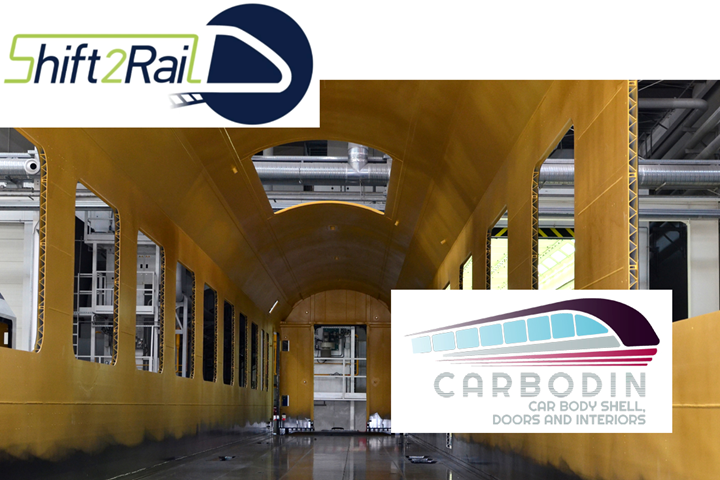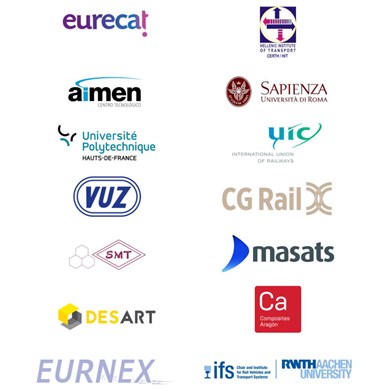Shift2Rail issues call for molding tools to produce composite door, interiors demonstrators
Tenders for molding tools in EU project to manufacture composites using compression molding process or equivalent due by April 22, 2021.

With the mission “Moving European Railway Forward,” the Shift2Rail Joint Undertaking pursues railway research and innovation in Europe to achieve goals such as:
- Cutting the life-cycle cost of railway transports by as much as 50%
- Doubling railway capacity
- Increasing reliability and punctuality by as much as 50%.
This includes projects such as CARBODIN which aims to improve railcar body shell manufacturing by exploring the possibilities offered by composite materials. As part of this project, Shift2Rail (S2R) has issued a call for tenders to supply modular tooling for the production of composite rail doors and interiors. Responses are required to be entered via the TED e-tendering website by April 22, 2021.
Modular tooling in CARBODIN project

CARBODIN consortium partners. Photo Credit: CARBODIN
CARBODIN (Car Body Shells, Doors and Interiors) is a €3.5 million project led by EURECAT (Barcelona, Spain) in collaboration with 13 other European partners from seven different countries, representing a balanced combination of academia, industry (including small- and medium-sized enterprises), associations and research organizations. This 24-month project, which began in Dec. 2019, advocates for modular tooling to manufacture a wide range of parts of varying sizes. It also proposes combining different production techniques and automation concepts with the introduction of co-cured and co-bonded composite parts and multi-material integrated joints and inserts. In addition, predictive maintenance (PM) will be reinforced by testing intelligent sensors.
Composite materials will also be the core idea for cost-efficient doors with reduced life cycle cost (LCC). The creation of modular tooling combined with 3D technology will enable the production of lighter doors with enhanced thermal and acoustic properties in the door and its vicinity.
CARBODIN will also facilitate the design of attractive train interiors by developing a configuration tool based on virtual reality. This will be complemented by innovative manufacturing tools for interior components. Other strategies for improving the cost-effectiveness of manufacturing processes, such as the integration of low-volt circuits in panels for distributed power, will be also explored. Plans detailed in the Dec. 2019 kickoff meeting include:
Car Body Shells: Efforts will focus on the development of smart, automated, modular and cost-efficient mold processes for car body shell manufacturing based on out-of-autoclave (OOA) processes. Development of structural health monitoring (SHM) systems for the car body shell, as well as multi-material and 3D-printed parts and tools will help to produce lightweight and high-reliability parts.
Doors: Efforts will concentrate on the development of manufacturing tools for composites aimed at cost reduction. Moreover, technologies for improving the comfort of doors and their surrounding areas will be developed, ensuring thermal and acoustic insulation, as well as accessibility solutions.
Interiors: Solutions will be developed to allow modular and aesthetic interior designs and layouts at low cost and low lead time, to identify new human-machine interactions (HMI) for the cabin of the future, and to integrate low-volt circuits in panels.
CARBODIN has received funding from the Shift2Rail JU under the European Union’s Horizon 2020 research and innovation program, under Grant Agreement 881814.
Related Content
-
Combining multifunctional thermoplastic composites, additive manufacturing for next-gen airframe structures
The DOMMINIO project combines AFP with 3D printed gyroid cores, embedded SHM sensors and smart materials for induction-driven disassembly of parts at end of life.
-
The potential for thermoplastic composite nacelles
Collins Aerospace draws on global team, decades of experience to demonstrate large, curved AFP and welded structures for the next generation of aircraft.
-
Jeep all-composite roof receivers achieve steel performance at low mass
Ultrashort carbon fiber/PPA replaces steel on rooftop brackets to hold Jeep soft tops, hardtops.












.jpg;maxWidth=300;quality=90)


